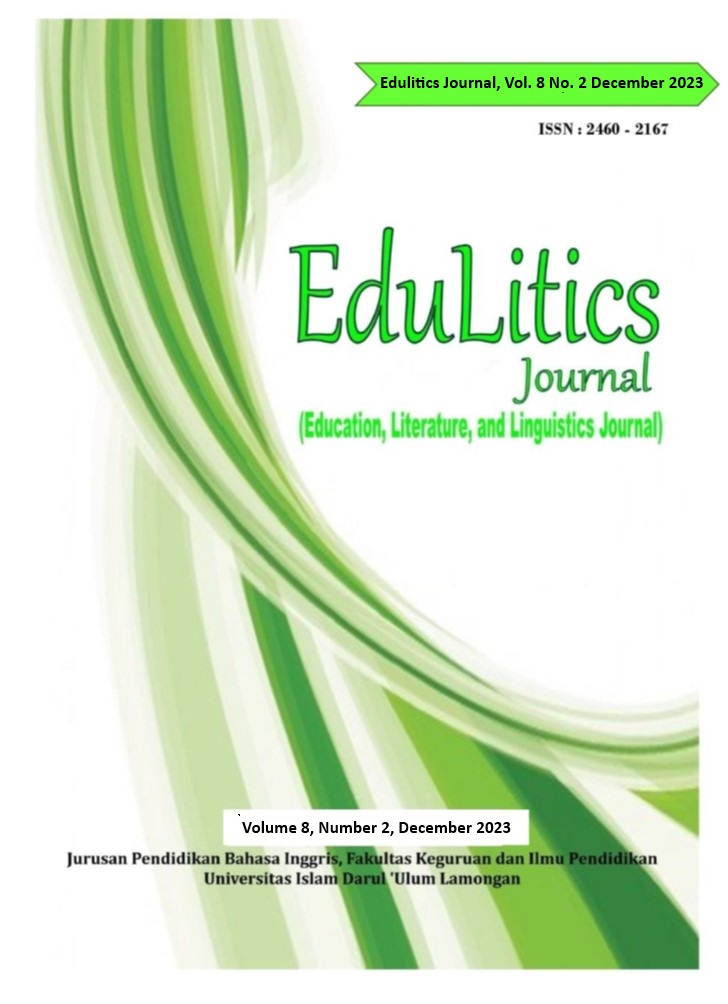The Language Relativity on Students' Essay Writing by Utilizing Mind Mapping Technique in EFL Learning
Abstract
This article discusses essay writing techniques, preposition and transitional words, and terms that cannot be lexically or syntactically comprehended but can be culturally understood. The purpose of this study is to discover language relativity in students' essay paragraphs utilizing a mind mapping technique in EFL learning. The researcher employed a descriptive strategy, observing and documenting the writing process in class. The participants were distinguished by their diverse living, educational, and professional backgrounds. These writings were descriptively assessed using appropriate literature, and observations were also undertaken to arrive at a reasonable interpretation. As a result, mind mapping with language relativity integrates meaningful students' knowledge such as history, linguistics such as preposition and transition word usage, and Indonesian cultural types and values such as Sarabi, Gempol Ice, and Rujak Cingur are Indonesian iconic culinary to organize and structure into essay writing fluently in EFL learning.
Downloads
References
Chang, M.-H. (2018). A Book Review of Integrating Chinese Linguistic Research and Language Teaching and Learning. Taiwan: Taiwan Journal of Linguistics.
Davidson, A. (2018). Writing: the re-construction of language. Language Sciences, 12.
Davies, A., & Elder, C. (2004). The Handbook of Applied Linguistics. Australia: Blackwell.
Fu, Q.-K., Lin, C.-J., Hwang, G.-J., & Zhang, L. (2019). Impacts of a mind mapping-based contextual gaming approach on EFL students’ writing performance, learning perceptions and generative uses in an English course. Computers & Education, 74.
Grabe, W., & Kaplan, R. B. (2006). Applied Linguistics in North America. Applied Linguistics, 363.
Hogue, A., & Oshima, A. (2007). Introduction to Academic Writing, Third Edition. USA: Pearson Longman.
Lee, Y. E., Yoo, I. W., & Shin, Y. K. (2020). The use of English prepositions in lexical bundles in essays written by Korean university students. Journal of English for Academic Purposes, 6.
Mahadi, T. S., & Jafari, S. M. (2012). Language and Culture. International Journal of Humanities and Social Science, 234.
Martínez, I. M. (2020). Methods of data collection in English empirical linguistics research: Results of a recent survey. Language Sciences, 6.
Schwarz, V., & Ortiz, H. L. (2020). Systemic functional linguistics, teacher education, and writing outcomes for U.S. elementary English learners: A review of the literature. Journal of Second Language Writing, 5.
Sharifian, F. (2017). Cultural Linguistics and linguistic relativity. Language Sciences, 90.
Su, H., & Zhang, L. (2019). Local grammars and discourse acts in academic writing: A case study of ‘exemplification’ in Linguistics research articles. Journal of English for Academic Purposes, 18.
Uysal, H. H. (2008). Tracing the culture behind writing: Rhetorical patterns and bidirectional transfer in L1 and L2 essays of Turkish writers in relation to educational context. Journal of Second Language Writing, 193-195.
Vieluf, S., & Gobel, K. (2019). Making intercultural learning in EFL lessons interesting e The role of teaching processes and individual learning prerequisites and their interactions. Teaching and Teacher Education, 12.
Zarrabia, F., & Bozorgianb, H. (2020). EFL Students’Cognitive Performance during Argumentative Essay Writing: Alog-file data analysis. Computers andComposition, 10.

This work is licensed under a Creative Commons Attribution-ShareAlike 4.0 International License.
Authors retain copyright and grant the journal the right of first publication with the work simultaneously licensed under a Creative Commons Attribution-ShareAlike 4.0 International License that allows others to share the work with an acknowledgment of the work's authorship and initial publication in this journal.
Authors are able to enter into separate, additional contractual arrangements for the non-exclusive distribution of the journal's published version of the work (e.g., post it to an institutional repository or publish it in a book), with an acknowledgment of its initial publication in this journal.
Authors are permitted and encouraged to post their work online (e.g., in institutional repositories or on their website) before and during the submission process, as it can lead to productive exchanges and earlier and greater citation of published work.






_(1).png)


